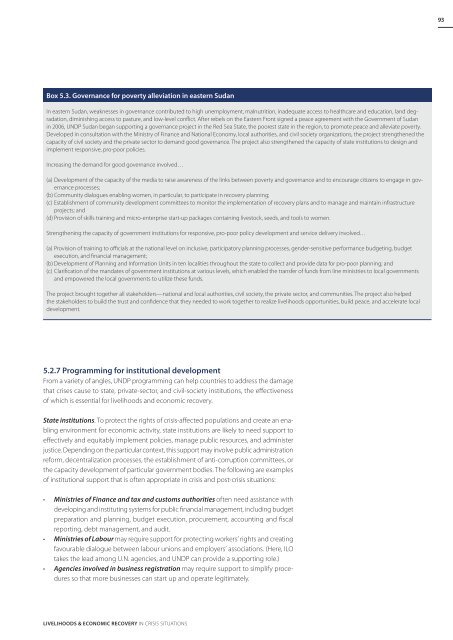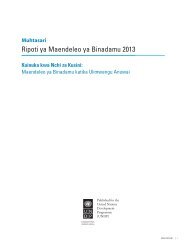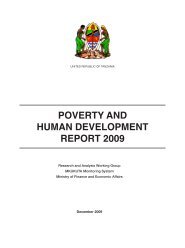Download PDF (4.08 MB) - ReliefWeb
Download PDF (4.08 MB) - ReliefWeb
Download PDF (4.08 MB) - ReliefWeb
Create successful ePaper yourself
Turn your PDF publications into a flip-book with our unique Google optimized e-Paper software.
93<br />
Box 5.3. Governance for poverty alleviation in eastern Sudan<br />
In eastern Sudan, weaknesses in governance contributed to high unemployment, malnutrition, inadequate access to healthcare and education, land degradation,<br />
diminishing access to pasture, and low-level conflict. After rebels on the Eastern Front signed a peace agreement with the Government of Sudan<br />
in 2006, UNDP Sudan began supporting a governance project in the Red Sea State, the poorest state in the region, to promote peace and alleviate poverty.<br />
Developed in consultation with the Ministry of Finance and National Economy, local authorities, and civil society organizations, the project strengthened the<br />
capacity of civil society and the private sector to demand good governance. The project also strengthened the capacity of state institutions to design and<br />
implement responsive, pro-poor policies.<br />
Increasing the demand for good governance involved…<br />
(a) Development of the capacity of the media to raise awareness of the links between poverty and governance and to encourage citizens to engage in governance<br />
processes;<br />
(b) Community dialogues enabling women, in particular, to participate in recovery planning;<br />
(c) Establishment of community development committees to monitor the implementation of recovery plans and to manage and maintain infrastructure<br />
projects; and<br />
(d) Provision of skills training and micro-enterprise start-up packages containing livestock, seeds, and tools to women.<br />
Strengthening the capacity of government institutions for responsive, pro-poor policy development and service delivery involved…<br />
(a) Provision of training to officials at the national level on inclusive, participatory planning processes, gender-sensitive performance budgeting, budget<br />
execution, and financial management;<br />
(b) Development of Planning and Information Units in ten localities throughout the state to collect and provide data for pro-poor planning; and<br />
(c) Clarification of the mandates of government institutions at various levels, which enabled the transfer of funds from line ministries to local governments<br />
and empowered the local governments to utilize these funds.<br />
The project brought together all stakeholders—national and local authorities, civil society, the private sector, and communities. The project also helped<br />
the stakeholders to build the trust and confidence that they needed to work together to realize livelihoods opportunities, build peace, and accelerate local<br />
development.<br />
5.2.7 Programming for institutional development<br />
From a variety of angles, UNDP programming can help countries to address the damage<br />
that crises cause to state, private-sector, and civil-society institutions, the effectiveness<br />
of which is essential for livelihoods and economic recovery.<br />
State institutions. To protect the rights of crisis-affected populations and create an enabling<br />
environment for economic activity, state institutions are likely to need support to<br />
effectively and equitably implement policies, manage public resources, and administer<br />
justice. Depending on the particular context, this support may involve public administration<br />
reform, decentralization processes, the establishment of anti-corruption committees, or<br />
the capacity development of particular government bodies. The following are examples<br />
of institutional support that is often appropriate in crisis and post-crisis situations:<br />
• Ministries of Finance and tax and customs authorities often need assistance with<br />
developing and instituting systems for public financial management, including budget<br />
preparation and planning, budget execution, procurement, accounting and fiscal<br />
reporting, debt management, and audit.<br />
• Ministries of Labour may require support for protecting workers’ rights and creating<br />
favourable dialogue between labour unions and employers’ associations. (Here, ILO<br />
takes the lead among U.N. agencies, and UNDP can provide a supporting role.)<br />
• Agencies involved in business registration may require support to simplify procedures<br />
so that more businesses can start up and operate legitimately.<br />
Livelihoods & Economic Recovery in Crisis Situations





